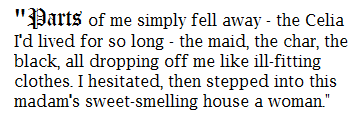I've been looking for books with a little more depth behind them than the generic chick flick I always come back to (hey, everyone has their own guilty pleasures right?). As I'm almost at the end of my English lit degree, I'm no longer forced to read things I wouldn't necessarily pick up, and what's more, I don't have the time to read ones I've missed because of the impending doom that is finals. So, over summer I'm going to try and read one that I didn't get around to every couple of weeks so that I make sure I keep my reaching schedule varied! Plus, it'll be great to read without a deadline.
Celia, mother of three, must work as a maid in South Africa in order to sustain herself and her children, two of which live with their grandmother. Miriam, her youngest child, lives with her in the white family's house and Celia must care for this young girl whilst performing all of the duties expected of her.
However, once Michael and Rita, Celia's employers, have a stillborn baby and realise that child bearing may not be a thing in their future, they begin to look at Miriam in a new light. Informed that they will take Miriam to England, and bring her up in an economically stable environment, or she be forced to find a new job and care for Miriam, Celia does what she feels is best for her child. Breaking her own heart, she hopes that Miriam will be happy. But, living in a predominantly white area and being outcast as an outsider at school in England, Miriam longs for home. As she grows older, Miriam realises she needs to find out more about her real identity, and begins a journey back to Africa. But, will there be more surprises than anticipated in Miriam's journey to self-awareness?
This wasn't the quickest page-turner for me, but as I said, it was good to read something with a little more depth to it. However, I'm someone who is oddly affected by the mood of a book, and so much of this was an endless depressing battering of any hope. This personally made it harder for me to want to come back to. And yes, I do get that books can't always be happy-go-lucky, but when the 17th thing in a row went wrong and smacked Celia or Miriam in the face I felt like flinging my kindle across the room. But, that's a miniscule percentage of the frustration that being in Celia or Miriam's position would have produced!
Have you read it? What did you think?
Steph x









